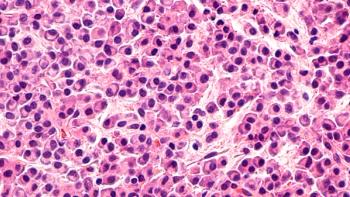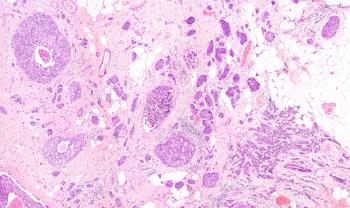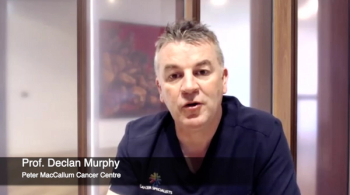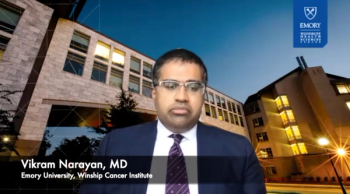
The hematology and oncology fellow at the Icahn School of Medicine at Mount Sinai highlighted multiple myeloma treatments that he believes have shown promise over the past year.

Your AI-Trained Oncology Knowledge Connection!


The hematology and oncology fellow at the Icahn School of Medicine at Mount Sinai highlighted multiple myeloma treatments that he believes have shown promise over the past year.

The GP2/GM-CSF combination demonstrated a 100% disease-free survival at 5 years for patients with HER2/neu 3–positive disease who received adjuvant trastuzumab.

For women with heavily pretreated, postmenopausal advanced or metastatic estrogen receptor (ER)–positive breast cancer, amcenestrant prompted antitumor activity.

The American Lung Association’s annual “State of Lung Cancer” (SOLC) report tracked the toll of lung cancer at national and state levels, identifying both promising improvements for the overall population and significant health disparities for racial and ethnic minorities.

The agency authorized use of the first coronavirus disease 2019 vaccine to prevent the disease caused by severe acute respiratory syndrome coronavirus 2 in individuals 16 years of age and older.

Neoadjuvant atezolizumab added to nab-paclitaxel followed by doxorubicin plus cyclophosphamide improved pathologic complete responses compared with placebo plus chemotherapy in patients with early triple-negative breast cancer without adding additional treatment burden.

Sacituzumab govitecan (Trodelvy) induced clinical benefit over physician’s choice of therapy in patients with metastatic triple-negative breast cancer, irrespective of Trop-2 expression, though greater efficacy was observed in those who had a medium or high Trop-2 score.

Frontline pembrolizumab (Keytruda) plus chemotherapy for patients with advanced triple-negative breast cancer showed efficacy across key subgroups, including patients with PD-L1 expression by combined positive score.

Treatment with ipatasertib plus paclitaxel (Abraxane) failed to show a significant improvement in progression-free survival versus placebo plus paclitaxel in patients with PIK3CA/AKT1/PTEN-altered locally advanced, unresectable, or metastatic triple-negative breast cancer.

The founder and CEO of Sema4 spoke about what health care providers currently lack in preventing and treating diseases and what the reality of early detection and disease prevention can provide to patients with cancer.

The clinical researcher spoke about what she hopes will occur in multiple myeloma research over the next 5 years.

The study found that favorable outcomes after treatment with lapatinib (Tykerb) were demonstrated by early declines in circulating tumor cell counts (CTCs) in patients with metastatic breast cancer who initially had HER2-negative primary tumors but positive HER2 CTCs.

Fewer deaths and improved cumulative incidence of central nervous system recurrences were shown at 8 years of follow-up with adjuvant neratinib (Nerlynx) compared with placebo in patients with early-stage HER2-positive breast cancer following trastuzumab (Herceptin)-based therapy.

Combination treatment with alpelisib (Piqray) and letrozole (Femara) sustained efficacy and did not result in any new safety signals in patients with PIK3CA-mutant HR-positive, HER2-negative advanced breast cancer who received prior treatment with the combination of a CDK4/6 inhibitor and fulvestrant (Faslodex).

Wolf discusses the potential for emerging next-generation CAR T-cell treatment and the future of treating patients with multiple myeloma.

Women who survive breast cancer may have more difficulty in becoming pregnant when compared to the general population, and have a risk of preterm labor, but most deliver healthy babies and experience no detrimental effects on their long-term survival.

The combination of oral paclitaxel and encequidar has the potential to be an effective treatment for patients with radiation-associated breast angiosarcoma.

Adhering to a diabetes risk reduction diet improved survival for women with stage 1 to 3 breast cancer compared to women who did not follow this specific diet.

Final data from a phase 2 trial suggested that the administration of trilaciclib before chemotherapy comprised of gemcitabine and carboplatin resulted in a significant improvement in overall survival in previously treated patients with metastatic triple-negative breast cancer.

Data from the APHINITY trial suggested that patients with early breast cancer with a HER2 single-activated pathway determined by molecular subtyping using BluePrint assay demonstrated a trend for greater benefit with adjuvant pertuzumab (Perjeta) therapy.

Treatment with the combination of oral paclitaxel and encequidar was found to be associated with greater efficacy in patients with metastatic breast cancer, as well as lower rates of chemotherapy-induced peripheral neuropathy, compared to intravenous paclitaxel.

Declan Murphy talked about the future of PSMA theranostics to target metastatic castration-resistant prostate cancer.

The hematology and oncology fellow at the Icahn School of Medicine at Mount Sinai discussed exciting treatment options for patients with multiple myeloma that are being presented at ASH this year.

Behavioral interventions were found to help young breast cancer survivors in reducing their depressive symptoms.

Impressive signals of efficacy, durable responses, overall survival rates, and a tolerable safety profile were all found for fam-trastuzumab deruxtecan-nxki to treat patients with HER2-positive metastatic breast cancer.

Narayan discusses what he thinks the future of nadofaragene firadenovec and bladder cancer are at this year’s SUO Meeting.

Ribociclib plus endocrine therapy continued to show a significant overall survival improvement, while delaying subsequent chemotherapy for patients with HR+/HER2-negative breast cancer.

An analysis of tamoxifen versus anastrozole showed no significant difference in terms of disease recurrence in postmenopausal women with locally excised ductal carcinoma in situ; however, the findings may highlight the understanding of associated toxicities.

The expert from Cedars-Sinai Cancer spoke about the continued integration of immunotherapy-based combination regimens, and the importance of utilizing the multidisciplinary care team to mitigate any possible toxicities that may arise.

PreciseDx, an artificial intelligence–digital breast cancer risk discrimination platform, was able to classify patients with Oncotype Dx low-risk recurrence scores with high accuracy using only hematoxylin and eosin stain images and limited clinical data.